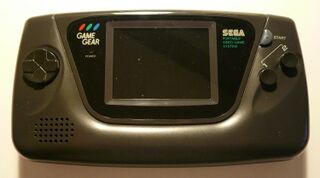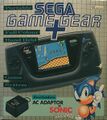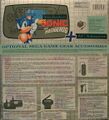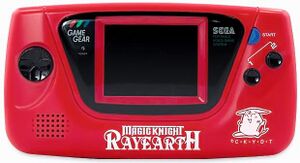Difference between revisions of "Sega Game Gear"
From Sega Retro
| Line 60: | Line 60: | ||
</gallery> | </gallery> | ||
| − | == Accessories == | + | ==Unreleased Accessories == |
| − | |||
| − | |||
| − | |||
| − | |||
| − | |||
| − | |||
| − | |||
| − | |||
| − | |||
=== Mega Gear / Mega Game Gear === | === Mega Gear / Mega Game Gear === | ||
This was a product supposedly in development early into the Game Gear's life that would allow Genesis users to play their Game Gear titles on their home console, similar to how the SNES could run Game Boy games using the Super Game Boy cartridge. There was very little, if any, official word from Sega about this, aside from very vague references in gaming magazines at the time. | This was a product supposedly in development early into the Game Gear's life that would allow Genesis users to play their Game Gear titles on their home console, similar to how the SNES could run Game Boy games using the Super Game Boy cartridge. There was very little, if any, official word from Sega about this, aside from very vague references in gaming magazines at the time. | ||
Revision as of 12:30, 28 November 2010
The Sega Game Gear is a handheld game console developed by Sega in 1989 and first released in Japan on October 6, 1990, with a North American launch in 1990 and European/Australian launch in 1991. Codenamed Mercury, it was developed in response to Nintendo's Game Boy handheld, released around the same time.
The Game Gear is basically a pocket Sega Master System with a VDP capable of displaying palettes consisting of a wider variety of colors than its predecessor and stereo sound. The system is held lengthwise at the sides, preventing the cramping of hands that plagued the Game Boy.
Sega of America advertised the Game Gear throughout its lifetime through a television advertising campaign involving amusing and bizarre spots, some directly attacking the Game Boy. One commercial shows a dog looking back and forth at both portables while the narrator says, "If you were colorblind and had an IQ of less than twelve, then you wouldn't care which portable you had. Of course, you wouldn't care if you drank from the toilet, either." Another has a gamer hitting himself in the head with a rigid, dead squirrel in order to see color on his Game Boy.
While its hardware was superior to the Game Boy and was its most successful and longest lasting competitor, a combination of poor design choices and poor third-party support led to the Game Gear's eventual decline and discontinuation in 1996/1997. For example, the Game Gear was bulky and required six AA batteries which the backlight on the LCD screen ate through in three hours (a battery pack which provided longer playtime was made; see below).
Due to the hardware similarities, many early Game Gear games were modifications of Master System games made to take advantage of the larger palette capabilities and smaller screen size. Several hardware adapters were made to allow you to play Master System games on the Game Gear, such as the official Master Gear.
Contents
Specifications
- Main Processor: Zilog Z80 (8-bit)
- Processor Speed: 3.579545 MHz (same as NTSC colorburst)
- Resolution: 160 x 144 pixels
- Colors Available: 4,096
- Colors on screen: 32
- Maximum Sprites: 64
- Sprite Size: 8x8
- Screen Size: 3.2 Inches
- Audio: 4-channel tone generator composed of three square waves and one white noise channel.
- RAM: 24 KB
Gallery
US
EU
- Gamegear eu box.jpg
Game Gear EU box
JP
J-League GG Pro Striker '94 JP Game Gear Box Front
J-League GG Pro Striker '94 JP Game Gear Box Back
Sonic Drift JP Game Gear Box Front
Sonic Drift JP Game Gear Box Back
Coca-Cola Kid JP Game Gear Box Front
BR
Sonic the Hedgehog + Columns BR Game Gear Box Front
Sonic the Hedgehog + Columns BR Game Gear Box Front
Unreleased Accessories
Mega Gear / Mega Game Gear
This was a product supposedly in development early into the Game Gear's life that would allow Genesis users to play their Game Gear titles on their home console, similar to how the SNES could run Game Boy games using the Super Game Boy cartridge. There was very little, if any, official word from Sega about this, aside from very vague references in gaming magazines at the time. With the advent of console emulation, there have been attempts to prove that this method of playing Game Gear games is possible, and have been fruitful: there are utilities available that supposedly convert Game Gear ROMs to Genesis-format ROMs, however their ability is unproven, as they will generally not function in any current emulators.
Alternate Models
Game Gear development hardware
This, along with a TV-Out modified Game Gear, consists of two cards to plug into a PC, an In- Circuit Emulator, a 5.25" floppy (presumably containing an assembler) and a LARGE circuit board - with composite video out.
Coca-Cola Game Gear
This was a limited-edition Japan-only release of the Game Gear as part of a promotion between Sega and Coca-Cola. It is exactly the same as a standard Game Gear console, save from a deep red color instead of the standard black. It was released with a similarly limited-edition game named 'Coca-Cola Kid'. An example of this unit is on display at the Coca-Cola museum in Atlanta.
In 2005, Coca-Cola released another limited edition handheld, the Coca-Cola Edition of the PlayStation Portable.
MKR Game Gear/Kids Gear
Another Japanese Game Gear variant is Magic Knight Rayearth GG, which sported a red color, and featured the Rayearth logo. Another variant is the so-called 'Kids Gear', released in 1996. This variant is again a standard Game Gear, only renamed and featuring a large Virtua Fighter 2 image fascia, which reflected the pack-in title (Virtua Fighter 2).
Handy Gam*Boy
A South Korean varient, distributed by Samsung in 1991.
Majesco Game Gear
The Majesco Game Gear is a model of Game Gear designed by Majesco. The casing is the same as the original Game Gear but the Game Gear logo was colored white. It is also incompatible with the first version of the Master Gear Converter and the Sega Game Gear TV Tuner.
List of Games
- 5 in One Fun Pak (1994)
- Aah! Harimanada (1993)
- The Addams Family (1993)
- The Adventures of Batman & Robin (1995)
- Aerial Assault (1992)
- Aladdin (1994)
- Alien³ (1992)
- Alien Syndrome (1992)
- Andre Agassi Tennis (1993)
- Arcade Classics (1996)
- Arch Rivals (1992)
- Arena: Maze of Death (1995)
- Ariel the Little Mermaid (1992)
- Asterix and the Great Rescue (1993)
- Asterix and the Secret Mission (1993)
- Ax Battler: A Legend of Golden Axe (1991)
- Ayrton Senna's Super Monaco GP II (1992)
- Baku Baku Animal (1996)
- Batman Forever (1995)
- Batman Returns (1992)
- Batter Up (1991)
- Battleship: The Classic Naval Combat Game (1993)
- Battletoads (1993)
- Beavis and Butt-head (1994)
- Berenstain Bears, The: Camping Adventure (1994)
- Berlin no Kabe (1991)
- Bishoujo Senshi Sailor Moon S (1995)
- Bram Stoker's Dracula (1992)
- Bubble Bobble (1994)
- Bugs Bunny in Double Trouble (1996)
- Bust-A-Move (1995)
- Buster Ball (1992)
- Buster Fight (1994)
- Caesar's Palace (1993)
- Captain America and the Avengers (1993)
- Car Licence (1995)
- Casino Fun Pack (1995)
- Castle of Illusion Starring Mickey Mouse (1991)
- Chakan: The Forever Man (1992)
- Championship Hockey (1994)
- Chase H.Q. (1991)
- Cheese Cat-Astrophe with Speedy Gonzales (1995)
- Chessmaster, The (1991)
- Chicago Syndicate (1995)
- Choplifter III (1993)
- Chuck Rock (1992)
- Chuck Rock II: Son of Chuck (1994)
- CJ Elephant Fugitive (1991)
- Cliffhanger (1993)
- Clutch Hitter (1991)
- Coca-Cola Kid (1994)
- Columns (1990)
- Cool Spot (1993)
- Cosmic Spacehead (1993)
- Crayon Shin-chan: Taiketsu! Kantam Panic!! (1995)
- Crystal Warriors (1991)
- Cutthroat Island (1995)
- Daffy Duck in Hollywood (1994)
- Deep Duck Trouble Starring Donald Duck (1993)
- Defenders of Oasis (1992)
- Desert Speedtrap starring Road Runner & Wile E. Coyote (1994)
- Desert Strike: Return to the Gulf (1992)
- Devilish (1991)
- Disney's Bonkers: Wax Up! (1995)
- Doraemon: Nora no Suke no Yabou (1993)
- Doraemon: Wakuwaku Pocket Paradise (1996)
- Double Dragon (1993)
- Dr. Robotnik's Mean Bean Machine (1993)
- Dragon: The Bruce Lee Story (1994)
- Dragon Crystal (1990)
- Dropzone (1994)
- Dunk Kids (1994)
- Dynamite Headdy (1994)
- Earthworm Jim (1995)
- Ecco the Dolphin (1994)
- Ecco: The Tides of Time (1994)
- Ernie Els Golf (1994)
- Eternal Legend: Eien no Densetsu (1991)
- Evander "Real Deal" Holyfield's Boxing (1992)
- Excellent Dizzy Collection, The (1995)
- F-15 Strike Eagle (1993)
- F1 (1993)
- F1 World Championship Edition (1995)
- Faceball 2000 (1993)
- Factory Panic (1991)
- Fantastic Dizzy (1993)
- Fantasy Zone (1991)
- Fatal Fury Special (1994)
- FIFA International Soccer (1994)
- FIFA Soccer 95 (1994)
- FIFA Soccer 96 (1995)
- Foreman For Real (1995)
- Frank Thomas' Big Hurt Baseball (1995)
- Fray: Shuugyouhen (1991)
- Fred Couples Golf (1994)
- From TV Animation: Slam Dunk: Shouri heno Starting 5 (1994)
- G-LOC: Air Battle (1990)
- Galaga 2 (1991)
- Gamble Panic (1995)
- Gambler Jikochuushin Ha (1992)
- Garfield: Caught in the Act (1995)
- Gear Works (1994)
- George Foreman's KO Boxing (1992)
- GG Aleste (1991)
- GG Portrait: Pai Chan (1996)
- GG Portrait: Yuuki Akira (1996)
- Global Gladiators (1992)
- Godzilla: Kaijuu no Daishingeki (1995)
- GP Rider (1994)
- Greendog: The Beached Surfer Dude! (1993)
- Griffin (1991)
- Gunstar Heroes (1995)
- Halley Wars (1991)
- Head Buster (1991)
- Heavyweight Champ (1991)
- Home Alone (1992)
- Honoo no Doukyuuji: Dodge Danpei (1992)
- Hook (1992)
- House of Tarot (1991)
- Hurricanes (1994)
- Hyokkori Hyoutan Jima: Hyoutan Jima no Daikoukai (1992)
- Hyper Pro Yakyuu '92 (1992)
- Incredible Crash Dummies, The (1992)
- Incredible Hulk, The (1994)
- Indiana Jones and the Last Crusade (1992)
- Iron Man and X-O Manowar in Heavy Metal (1996)
- Itchy and Scratchy Game, The (1995)
- J.League GG Pro Striker '94 (1994)
- J.League Soccer: Dream Eleven (1995)
- James Bond 007: The Duel (1993)
- James Pond II: Codename RoboCod (1993)
- James Pond 3: Operation Starfish (1994)
- Jeopardy! (1993)
- Jeopardy!: Sports Edition (1994)
- Joe Montana Football (1991)
- Journey from Darkness: Strider Returns (1992)
- Judge Dredd (1995)
- Junction (1991)
- The Jungle Book (1993)
- Jungle Strike (1995)
- Jurassic Park (1993)
- Kaitou Saint Tail (1996)
- Kawasaki Superbikes (1995)
- Kenyuu Densetsu Yaiba (1994)
- Kinetic Connection (1991)
- Kishin Douji Zenki (1995)
- Klax (1992)
- Krusty's Fun House (1992)
- Kuni-Chan no Game Tengoku (1991)
- Kuni-Chan no Game Tengoku Part 2 (1992)
- Land of Illusion starring Mickey Mouse (1993)
- Last Action Hero (1992)
- Legend of Illusion Starring Mickey Mouse (1994)
- Lemmings (1992)
- Lion King, The (1994)
- Lost World, The: Jurassic Park (1997)
- Lucky Dime Caper Starring Donald Duck, The (1991)
- Lunar: Samposuru Gakuen (1996)
- Madden NFL '95 (1995)
- Madden NFL '96 (1995)
- Madou Monogatari I: 3-tsu no Madouryoku (1993)
- Madou Monogatari II: Arles 16-Sai (1994)
- Madou Monogatari III: Kyuukyoku Joou-Sama (1994)
- Madou Monogatari A: Dokidoki Vacation (1995)
- Mahou Kishi Rayearth (1994)
- Mahou Kishi Rayearth 2: Making of Magic Knight (1994)
- Magical Puzzle Popils (1991)
- Magical Taruruto-kun (1991)
- Majors Pro Baseball, The (1992)
- Mappy (1991)
- Marble Madness (1992)
- Marko's Magic Football (1993)
- McDonald's: Ronald in The Magical World (1994)
- Mega Man (1995)
- Megami Tensei Gaiden: Last Bible (1994)
- Megami Tensei Gaiden: Last Bible S (1995)
- Mickey's Ultimate Challenge (1994)
- Micro Machines (1993)
- Micro Machines 2: Turbo Tournament (1995)
- Mighty Morphin Power Rangers (1994)
- Mighty Morphin Power Rangers: The Movie (1995)
- MLBPA Baseball (1995)
- Moldorian: Hikari to Yami no Kyoudai (1994)
- Monster Truck Wars (1994)
- Mortal Kombat (1992)
- Mortal Kombat II (1994)
- Mortal Kombat 3 (1995)
- Ms. Pac-Man (1995)
- Nazo Puyo (1993)
- Nazo Puyo 2 (1993)
- Nazo Puyo: Aruru no Ru (1994)
- NBA Action starring David Robinson (1994)
- NBA Jam (1993)
- NBA Jam Tournament Edition (1994)
- NFL '95 (1994)
- NFL Quarterback Club (1994)
- NFL Quarterback Club 96 (1995)
- NHL All-Star Hockey (1995)
- NHL Hockey (1995)
- Ninja Gaiden (1991)
- Ninku (1995)
- Ninku 2: Tenkuryu-e no Michi (1995)
- Ninku Gaiden: Heroyuki Daikatsugeki (1995)
- Olympic Gold: Barcelona '92 (1992)
- Ottifants, The (1992)
- OutRun (1991)
- OutRun Europa (1992)
- Pac Attack (1994)
- Pac-Man (1991)
- Panzer Dragoon Mini (1996)
- Paperboy (1991)
- Paperboy 2 (1992)
- Pengo (1990)
- Pet Club: Inu Daisuki! (1996)
- Pet Club: Neko Daisuki! (1996)
- Pete Sampras Tennis (1994)
- PGA Tour Golf (1991)
- PGA Tour Golf II (1992)
- PGA Tour 96 (1996)
- Phantasy Star Adventure (1992)
- Phantasy Star Gaiden (1992)
- Phantom 2040 (1995)
- Pinball Dreams (1993)
- Pocket Jansou (1992)
- Poker Face Paul's Blackjack (1994)
- Poker Face Paul's Gin (1994)
- Poker Face Paul's Poker (1994)
- Poker Face Paul's Solitaire (1994)
- Pop Breaker (1991)
- Popeye no Beach Volleyball (1994)
- Power Drive (1994)
- Power Strike II (1993)
- Predator 2 (1992)
- Primal Rage (1994)
- Prince of Persia (1992)
- Pro Yakyuu '91, The (1991)
- Pro Yakyuu GG League (1993)
- Pro Yakyuu GG League '94 (1994)
- Psychic World (1991)
- Putt & Putter (1991)
- Puyo Puyo (1993)
- Puyo Puyo 2 (1994)
- Puzzle & Action: Ichidant-R GG (1994)
- Puzzle & Action: Tanto-R (1994)
- Quest for the Shaven Yak starring Ren and Stimpy (1994)
- Quiz Gear Fight!!, The (1995)
- Rastan Saga (1991)
- RBI Baseball '94 (1994)
- R.C. Grand Prix (1992)
- Riddick Bowe Boxing (1993)
- Rise of the Robots (1994)
- Ristar (1995)
- Road Rash (1993)
- Robocop 3 (1993)
- RoboCop Versus The Terminator (1993)
- Royal Stone: Hirakareshi Toki no Tobira (1995)
- S.S. Lucifer: Man Overboard! (1993)
- Samurai Shodown (1994)
- Schtroumpfs, Les (1994)
- Schtroumpfs, Les: Autour du Monde (1996)
- Scratch Golf (1994)
- SD Gundam: Winner's History (1995)
- Sega Game Pack 4 in 1 (1992)
- Sensible Soccer (1994)
- Shanghai II (1990)
- Shaq Fu (1995)
- Shikinjou (1991)
- Shining Force Gaiden - Ensei, Jashin no Kuni e (1992)
- Shining Force II: The Sword of Hajya (1994)
- Shining Force Gaiden: Final Conflict (1995)
- Shinobi (1991)
- Shinobi II: The Silent Fury (1992)
- Side Pocket (1994)
- Simpsons, The: Bartman Meets Radioactive Man (1992)
- Simpsons, The: Bart vs. the Space Mutants (1992)
- Simpsons, The: Bart vs. the World (1993)
- Slider (1991)
- Solitaire Funpak (1994)
- Solitaire Poker (1991)
- Sonic Blast (1996)
- Sonic Chaos (1993)
- Sonic Drift (1994)
- Sonic Drift 2 (1995)
- Sonic Labyrinth (1995)
- Sonic the Hedgehog Spinball (1993)
- Sonic The Hedgehog (1991)
- Sonic The Hedgehog 2 (1992)
- Sonic Triple Trouble (1994)
- Soukoban (1990)
- Space Harrier (1991)
- Spider-Man (1992)
- Spider-Man: Return of the Sinister Six (1993)
- Spider-Man and the X-Men: Arcade's Revenge (1992)
- Sports Illustrated Championship Football & Baseball (1995)
- Sports Trivia: Championship Edition (1995)
- Stargate (1994)
- Star Trek: The Next Generation: The Advanced Holodeck Tutorial (1994)
- Star Trek Generations: Beyond the Nexus (1994)
- Star Wars (1993)
- Star Wars: Super Return of the Jedi (1995)
- Streets of Rage (1992)
- Streets of Rage 2 (1993)
- Striker (1995)
- Super Battletank (1992)
- Super Columns (1995)
- Super Golf (1991)
- Super Kick-Off (1991)
- Super Momotarou Dentetsu III (1995)
- Super Monaco GP (1990)
- Super Off Road (1992)
- Super Smash TV (1992)
- Super Space Invaders (1992)
- Superman: The Man of Steel (1993)
- Surf Ninjas (1993)
- Sylvan Tale (1995)
- T2: The Arcade Game (1993)
- Tails' Adventure (1995)
- Tails' Skypatrol (1995)
- Taisen Mahjong HaoPai (1990)
- Taisen Mahjong HaoPai 2 (1993)
- Taisen-gata: Daisenryaku G (1991)
- TaleSpin (1993)
- Tama & Friends Sanchoume Kouen: Tamalympic (1995)
- Tarzan: Lord of the Jungle (1994)
- Tatakae! Pro Yakyuu Twin League (1995)
- Taz-Mania (1992)
- Taz: Escape from Mars (1994)
- Tempo Jr. (1995)
- Tengen World Cup Soccer (1993)
- The Terminator (1992)
- Terminator 2: Judgment Day (1993)
- Tesserae (1993)
- Tintin au Tibet (1996)
- Tom and Jerry: The Movie (1993)
- Torareta Tamaruka (1994)
- True Lies (1995)
- Ultimate Soccer (1993)
- Urban Strike (1995)
- Vampire: Master of Darkness
- Virtua Fighter Animation (1996)
- VR Troopers (1995)
- Wagyan Land (1991)
- Wheel of Fortune (1992)
- Wimbledon (1992)
- Winter Olympics: Lillehammer 94 (1993)
- Wizard Pinball (1995)
- Wolfchild (1993)
- Wonder Boy (1990)
- Wonder Boy III: The Dragon's Trap (1992)
- Woody Pop (1991)
- World Class Leader Board Golf (1991)
- World Cup USA '94 (1993)
- World Derby (1994)
- World Series Baseball (1993)
- World Series Baseball '95 (1994)
- WWF RAW (1994)
- WWF WrestleMania: Steel Cage Challenge (1993)
- X-Men (1994)
- X-Men: GamesMaster's Legacy (1994)
- X-Men: Mojo World (1996)
- YuYu Hakusho: Horobishi Mono no Gyakushuu (1994)
- YuYu Hakusho II: Gekitou! Nanakyou no Tatakai (1994)
- Zan Gear (1990)
- Zool (1993)
- Zoop (1995)
External links
- Console Database - Sega Game Gear info and FAQs
- SMS Power - Technical information and more on the Game Gear and its bigger brother, the Master System
| Sega Home Video Game Systems | ||||||||||||||||||||||||||||
| 83 | 84 | 85 | 86 | 87 | 88 | 89 | 90 | 91 | 92 | 93 | 94 | 95 | 96 | 97 | 98 | 99 | 00 | 01 | 02 | 03 | 04 | 05 | 06 | 07 | 08 | 09 | 10 | 11 |
|---|---|---|---|---|---|---|---|---|---|---|---|---|---|---|---|---|---|---|---|---|---|---|---|---|---|---|---|---|
| SG-1000 | SG-1000 II | Mega Drive | Mega Drive II | |||||||||||||||||||||||||
| SC-3000 | Mega-CD | Mega-CD II | Genesis 3 | |||||||||||||||||||||||||
| Sega Mark III | 32X | Dreamcast | ||||||||||||||||||||||||||
| Master System | Master System II | |||||||||||||||||||||||||||
| AI Computer | Game Gear | |||||||||||||||||||||||||||
| Saturn | ||||||||||||||||||||||||||||
| Pico | Beena | |||||||||||||||||||||||||||
| Sega Game Gear | |
| Topics | Sega Game Gear | History | Magazine articles | Promotional material | Merchandise |
|---|---|
| Hardware | Japan | North America | Western Europe | Eastern Europe | Asia | South America | Australasia | Africa Wide Gear | Fun Play 20-in-1 |
| Add-ons | Pro Action Replay | Game Genie | X-Terminator | Master Gear Converter (Gear Master | Nuby Converter) | Stereo FM Tuner | TV Tuner |
| Cases | Carry-All | Deluxe Carry-All Case | Gear Bag | Holster Case | Standard Carrying Case | Soft Case | Third Party (Play & Carry Case) |
| Accessories | A/V Cable | Battery Pack | Car Adaptor | Car Antenna | Cleaning Gear | Gear-to-Gear Cable | PowerBack (Third Party) | Screen Magnifier (Wide Gear | Super Wide Gear | Third-Party) |
| Development Tools | Sega Game Gear Development Board |




















